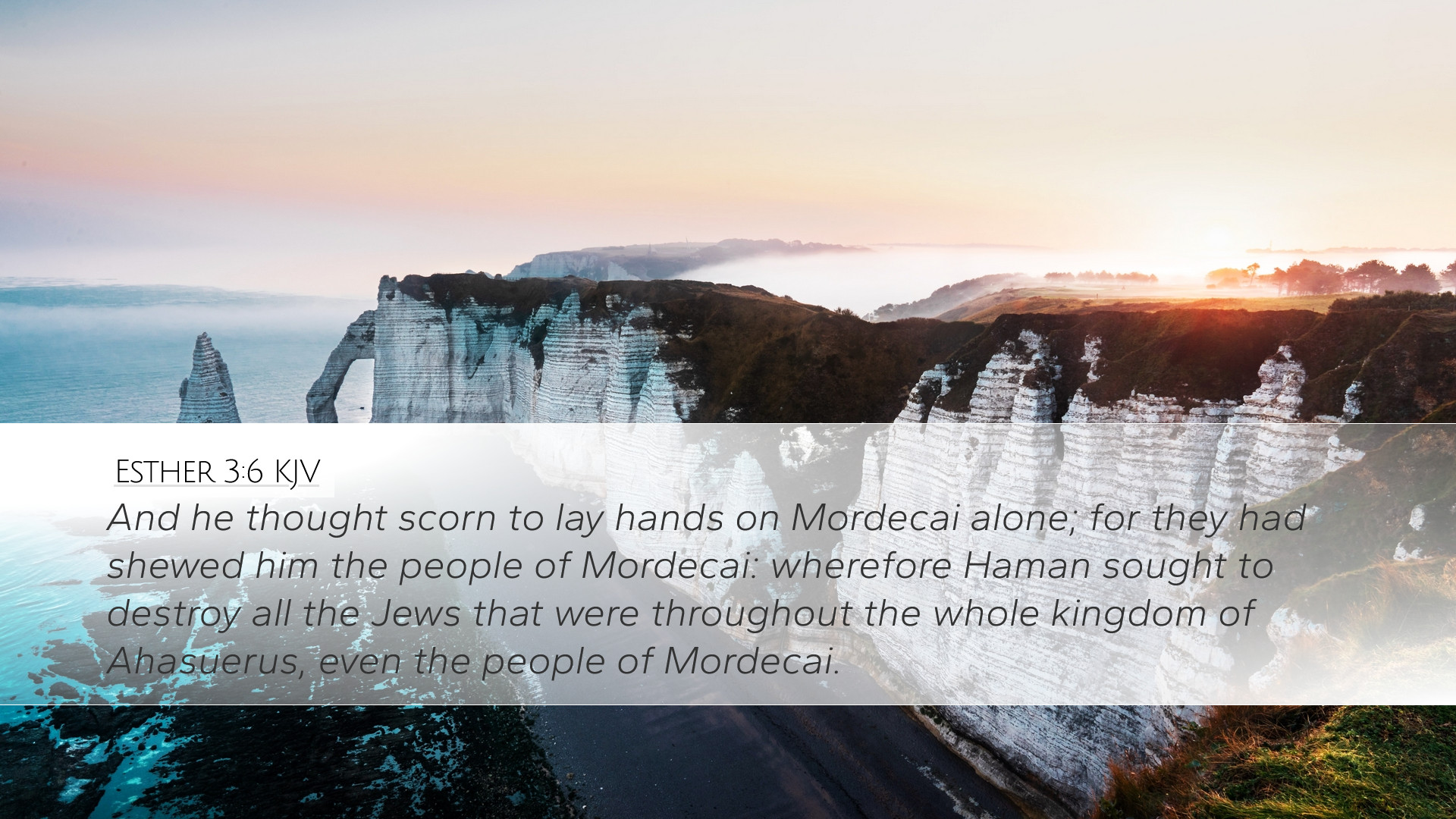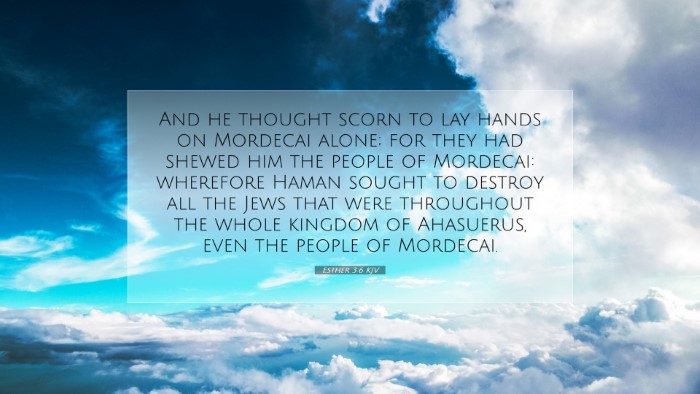Old Testament
Genesis Exodus Leviticus Numbers Deuteronomy Joshua Judges Ruth 1 Samuel 2 Samuel 1 Kings 2 Kings 1 Chronicles 2 Chronicles Ezra Nehemiah Esther Job Psalms Proverbs Ecclesiastes Song of Solomon Isaiah Jeremiah Lamentations Ezekiel Daniel Hosea Joel Amos Obadiah Jonah Micah Nahum Habakkuk Zephaniah Haggai Zechariah MalachiEsther 3:6
Esther 3:6 KJV
And he thought scorn to lay hands on Mordecai alone; for they had shewed him the people of Mordecai: wherefore Haman sought to destroy all the Jews that were throughout the whole kingdom of Ahasuerus, even the people of Mordecai.
Esther 3:6 Bible Commentary
Commentary on Esther 3:6
Esther 3:6 states, "But he disdained to lay hands on Mordecai alone, for they had told him that the people of Mordecai were Jews." This verse highlights the tension between Haman, a high-ranking official, and Mordecai, a Jew. In this commentary, we explore insights from Matthew Henry, Albert Barnes, and Adam Clarke to provide a comprehensive understanding of this verse.
Contextual Overview
To appreciate the significance of Esther 3:6, one must consider the broader narrative of the Book of Esther. This book details the providential guidance of God in the lives of the Jewish people during their exile in Persia. The rise of Haman as an antagonist sets the stage for the unfolding drama that will test the faith and courage of Esther and Mordecai.
Insights from Matthew Henry
According to Matthew Henry, Haman's disdain for Mordecai is emblematic of a broader theme of pride and enmity that runs throughout the narrative. Haman, despite his high position, finds Mordecai's refusal to bow to him intolerable. Henry draws attention to the motivations behind Haman's actions, underscoring that it was not merely Mordecai's perceived insult that ignited Haman's wrath, but also the identity of Mordecai as a Jew.
- Pride and Hatred: Henry notes that Haman's pride leads him to seek not just the punishment of Mordecai, but the annihilation of his entire people. This intense hatred is a reflection of Haman's character, suggesting that hatred for God's people can lead to catastrophic outcomes.
- The Jewish Identity: Haman's knowledge of Mordecai’s ethnicity plays a crucial role in his decision-making. Henry emphasizes that understanding one's identity can provoke both persecution and divine protection, a recurring theme in the Scriptures.
Thoughts from Albert Barnes
Albert Barnes offers a practical application of Esther 3:6, focusing on the consequences of Haman's burgeoning hatred and the resultant plan for annihilation. Barnes explains that Haman's decision to target the Jews illustrates a critical point about collective punishment—an individual transgression interpreted as warranting the harshest of penalties against an entire group.
- Collective Responsibility: Barnes comments on the moral implications of Haman's actions, suggesting that sins cannot be adjudicated based solely on group identity. He emphasizes that it is a profound moral error to punish the innocent for the resistance posed by an individual.
- Providence and Preservation: Barnes highlights the overarching theme of divine providence in the Book of Esther. Although Haman's plot sounds dire, it sets the stage for God's intervention and the eventual deliverance of the Jewish people, reminding readers of the faithfulness of God amid adversity.
Reflections from Adam Clarke
Adam Clarke provides a detailed analysis of the cultural and historical context surrounding Esther 3:6. He emphasizes the significance of Haman’s position and the wider implications of his disdain for Mordecai, noting how socio-political dynamics in Persia influenced their interactions.
- Cultural Significance: Clarke notes that Haman's refusal to respect the customs of moral conduct further illustrates the moral decay present within the court of Xerxes. The elevation of Haman provides insight into the corruptibility inherent in power structures, where personal vendettas can dictate state actions.
- Mordecai’s Courage: In contrast to Haman, Clarke portrays Mordecai as a figure of integrity and steadfastness. His unwillingness to bow before Haman illustrates a principled stand that becomes a catalyst for the events that follow, illustrating the power of divine conviction in the face of persecution.
Theological Implications
Esther 3:6 raises profound theological questions about identity, pride, and the dynamics of power. Theologically, this verse invites contemplation on the nature of evil, the reality of spiritual warfare, and the mysteries of God’s providence amidst adversity.
- Identity in Christ: The narrative serves as a reminder for believers today that our identity as children of God can provoke hostility from the world. Just as Mordecai's identity brought about Haman's wrath, Christians may face similar trials when living out their faith.
- God’s Sovereignty: The unfolding events highlight God’s ultimate sovereignty over the affairs of humanity. The complacency in Haman’s decisions contrasts with God’s providential care for His people, ensuring that even in dire situations, His purposes prevail.
- Moral Accountability: The actions of Haman are a warning about the dangers of unchecked power and the importance of moral accountability. Leaders must exercise their power with integrity, recognizing the profound impact of their decisions on those around them.
Conclusion
Esther 3:6 serves as a pivotal moment in the narrative of Esther, revealing profound layers of human emotion, moral imperatives, and divine interventions. Through the lenses of Matthew Henry, Albert Barnes, and Adam Clarke, readers gain rich insights into the complexities of pride, identity, and the overarching providential care of God for His people. As believers reflect on this verse, they are encouraged to stand firm in their identity, trust in God’s sovereignty, and recognize the ethical implications of their actions in a complex world.


